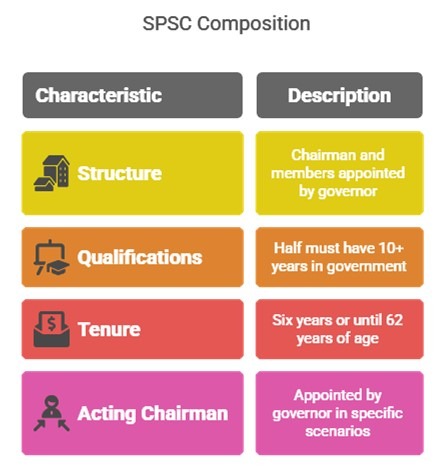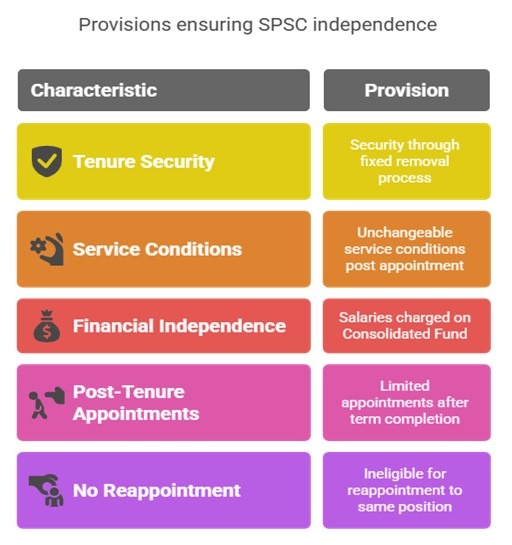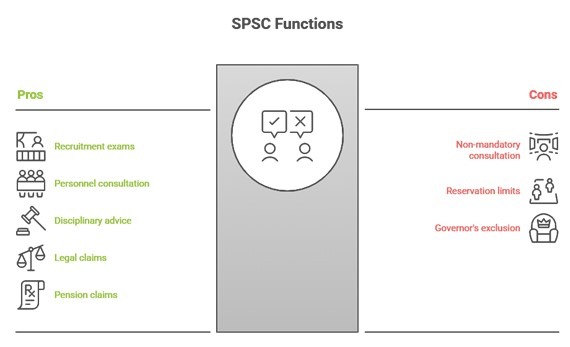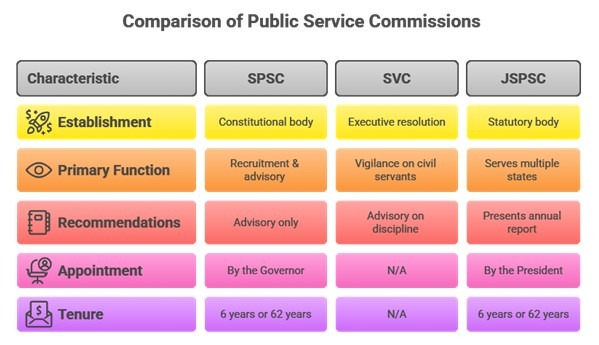State Public Service Commission (SPSC)
Similar to the Union Public Service Commission (UPSC) at the Centre, each state in India has its own State Public Service Commission (SPSC). The provisions governing SPSC are also outlined in Articles 315 to 323 of Part XIV of the Constitution, detailing its composition, functions, and independence.
Composition
- Structure: The SPSC consists of a chairman and other members appointed by the governor of the state. The Constitution does not specify the number of members, leaving it to the governor’s discretion. Typically, the SPSC comprises several members, including the chairman.
- Qualifications: While there are no specific qualifications required for membership, at least half of the members must have held office for a minimum of ten years under the Government of India or a state government.
- Tenure: The chairman and members serve a term of six years or until they reach the age of 62, whichever comes first. They may resign at any time by notifying the governor and can be removed by the president under certain conditions.
- Acting Chairman: The governor can appoint one of the members as an acting chairman if:
- The office of the chairman is vacant.
- The chairman is unable to perform duties due to absence or other reasons.

Removal
The chairman or any member of the SPSC can be removed by the President, not by the governor, under the following conditions:
- Insolvency: If deemed bankrupt.
- Paid Employment: If they engage in any paid employment outside their official duties.
- Unfitness: If found unfit to continue due to infirmity of body or mind.
For misbehavior, the president must refer the matter to the Supreme Court for inquiry. If the Supreme Court recommends removal, the president can act on that recommendation. The president can also suspend the individual pending inquiry.
Misbehavior is defined as involvement in contracts with the Government of India or a state, or profiting from such contracts, aside from general shareholder rights.
Independence
To ensure the independence and impartial functioning of the SPSC, the Constitution has established the following provisions:
1. Tenure Security: The chairman and members cannot be removed except in the manner and on the grounds laid down in the Constitution, thus guaranteeing security of tenure.
2. Service Conditions: The conditions of service determined by the governor cannot be altered to the disadvantage of members after their appointment.
3. Financial Independence: The salaries, allowances, and pensions of the chairman and members are charged on the Consolidated Fund of the state, freeing them from legislative votes.
4. Post-Tenure Appointments: The chairman is eligible for appointment as chairman of the UPSC or any other SPSC but not for other government roles. Members can pursue similar opportunities.
5. No Reappointment: A chairman or member completing a term is not eligible for reappointment to the same position.

Functions
The SPSC performs functions for state services analogous to the UPSC’s role for Central services:
1. Recruitment Examinations: Conducts examinations for appointments to state services.
2. Consultation on Personnel Management: The SPSC is consulted on various personnel management matters, including:
- Recruitment methods and principles for civil services and posts.
- Suitability of candidates for appointments and promotions.
- Disciplinary issues involving state civil service members, including:
- Censures and withholding increments or promotions.
- Recoveries of financial losses and demotions.
- Removal or dismissal from service.
- Claims for legal expense reimbursement incurred by civil servants during official duties.
- Pension claims for injuries sustained while serving.
- Other personnel-related matters.
If the government fails to consult the SPSC, aggrieved public servants have no court remedy, indicating that irregular consultation does not render government decisions invalid. Therefore, the provision functions in a directory rather than a mandatory manner.
Limitations
The following matters are outside the jurisdiction of the SPSC:
1. Reservations: Reservations for backward classes in appointments and posts.
2. Scheduled Castes and Tribes: Consideration of their claims in appointments.
The governor can exclude certain posts and matters from SPSC purview, and any regulations made must be presented to the state legislature, which can amend or repeal them.
The SPSC plays a critical role in the recruitment and management of state personnel, ensuring that appointments are conducted fairly while operating under constitutional safeguards to maintain independence and integrity.

Role of the State Public Service Commission (SPSC)
The Constitution envisions the State Public Service Commission (SPSC) as the “watchdog of the merit system” within the state. Its primary functions include:
- Recruitment: The SPSC is responsible for recruiting personnel for state services.
- Advisory Role: It advises the state government on matters of promotion and disciplinary actions when consulted.
However, the SPSC does not oversee classifications of services, pay structures, service conditions, or cadre management; these responsibilities lie with the Department of Personnel or the General Administration Department. Therefore, the SPSC functions solely as a central recruiting agency, while the Department of Personnel serves as the central personnel agency in the state.
Nature of Recommendations
The recommendations made by the SPSC are advisory and not binding on the government, allowing the state government to choose whether to accept or reject the SPSC’s advice. The only safeguard against arbitrary decisions is the requirement for the government to answer to the state legislature if it deviates from the SPSC’s recommendations. Furthermore, the state government can establish rules that regulate the SPSC’s advisory functions.
Impact of the State Vigilance Commission (SVC)
The establishment of the State Vigilance Commission (SVC) in 1964 influenced the SPSC’s role in disciplinary matters, as both bodies may be consulted on actions against civil servants. Issues can arise when the SVC and the SPSC provide conflicting advice. However, since the SPSC is an independent constitutional body, it holds an advantage over the SVC, which was created through an executive resolution.
In addition, the SPSC is consulted by the governor when formulating rules for appointments to state judicial services, excluding district judges, for which the state high court is also consulted.
Joint State Public Service Commission (JSPSC)
The Constitution allows for the establishment of a Joint State Public Service Commission (JSPSC) to serve two or more states. Unlike the UPSC and SPSC, which are created directly by the Constitution, a JSPSC is established through an act of Parliament at the request of the concerned state legislatures, making it a statutory body rather than a constitutional one.
For instance, Punjab and Haryana had a JSPSC for a brief period after Haryana was carved out of Punjab in 1966.
- Appointment and Tenure: The chairman and members of a JSPSC are appointed by the President and serve a term of six years or until they reach the age of 62, whichever comes first. They may be removed or suspended by the President and can resign at any time by submitting their resignation letters to the President.
- Annual Reporting: A JSPSC presents its performance report annually to each associated state governor, who then submits the report to the respective state legislature.
Additionally, the UPSC can assist states upon the request of the state governor and with the President’s approval.

Historical Background
The Government of India Act of 1919 established a Central Public Service Commission in 1926 tasked with recruiting civil servants. The Government of India Act of 1935 further provided for the establishment of both a Federal Public Service Commission and Provincial Public Service Commissions, as well as Joint Public Service Commissions for multiple provinces.
Articles Related to SPSC at a Glance
Article No. | Subject-matter |
315 | Public Service Commissions for the Union and the states |
316 | Appointment and term of office of members |
317 | Removal and suspension of a member of a Public Service Commission |
318 | Power to make regulations regarding the conditions of service of members and staff |
319 | Prohibition on holding office post-tenure |
320 | Functions of Public Service Commissions |
321 | Power to extend functions of Public Service Commissions |
322 | Expenses of Public Service Commissions |
323 | Reports of Public Service Commissions |
This summary highlights the essential features and functions of the SPSC, its composition, and the regulations governing its operation within the framework of the Indian Constitution.
